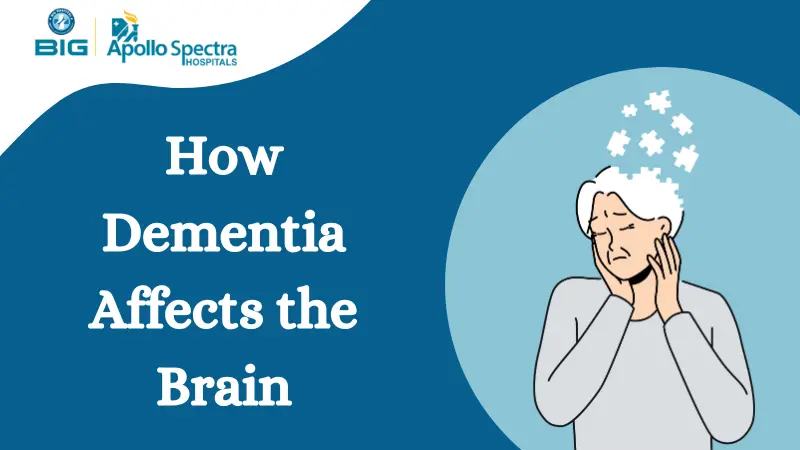Imagine losing the power to control your brain and remembering all those cherished childhood memories.
Yes, this is what suffering from dementia feels like. Brain doctors claim that dementia is a general term to describe a collection of symptoms that one may experience during abnormal brain changes.
This means that the causes behind dementia diseases are changes in some areas of the brain.
According to the best neurologist in Patna understanding those changes can be a great help in treating or preventing this devastating disease.
So, in this blog, we will try to know how dementia affects the brain in detail.
How Dementia Affects the Brain?
According to data, more than 55 million people suffer from this disease.
There can be numerous causes of dementia in which age and family history are the two most common ones.
To prevent this issue, it takes more than just knowing their causes.
Understanding how it affects the brain will make people aware of how it can disrupt their lives. So, here are the effects of dementia on the brain:
1. Neuronal Loss
From breathing to talking all the activities are initiated by the neurons.
They are nerve cells that send messages to all parts of the body to perform an activity.
Research and studies claim that dementia leads to the death of neurons, which affects several parts of the brain.
So, what part of the brain does dementia affect? Well, mainly it affects those parts that influence the memory, like the entorhinal cortex and hippocampus.
2. Amyloid Plaques
To be clear on how many sections of the brain are affected by dementia we must understand how it affects the brain in the first place.
Science says that the brain of a dementia patient does some abnormal things and accumulates unnecessary protein is one of them.
In dementia, the brain increases the production of proteins like Amyloid which accumulates and disrupts the functioning of neurons.
These Amyloid plaques generally form in the parts of the hippocampus.
3. Brain Atrophy
Shrinking of brain tissues is one of the common dementia symptoms.
Health experts call it the brain atrophy, which affects several areas of the brain.
Like all the other dementia symptoms it mainly affects the hippocampus and cerebral cortex, which handle the memory part.
Shrinking of tissue is not abnormal for the brain because it happens in normal human beings as they get older.
However, in people with brain issues like dementia, it happens at a much faster rate.
4. Neurotransmitter Imbalance
While discussing the dementia brain effects, we get to know that it damages the neurons in our brain.
It leads to the death of neurons, which creates an imbalance in the brain.
This imbalance of neurotransmitters like glutamate, acetylcholine, dopamine, and serotonin gives rise to cognitive, behavioral, and physical symptoms of dementia.
The imbalance also disrupts the connection between the neurons, resulting in other devastating symptoms.
5. Neuroinflammation
Alzheimer’s is one of the main types of dementia and research has found neuroinflammation in patients with Alzheimer’s disease.
This means that dementia diseases may result in neuroinflammation in the brain.
According to health experts, in neuroinflammation, the cells in the brain reduce the release of cytokines and chemokine, which may affect the blood-brain barrier negatively.
The blood-brain barrier works as a filtering mechanism for the capillaries that carry blood to the brain.
6. Vascular Changes
Alterations in blood vessels are one of the most common effects of dementia on the brain.
Blood vessels are like the connective paths by which the blood flows all around the body.
In vascular dementia, these paths change which affects the blood flow to the brain, and damages cognitive function.
It changes brain function from memory to thinking abilities and it’s also the second most common type of dementia after Alzheimer’s.
7. White Matter Damage
White matters are like highways that connect the different areas of the brain.
These nerve fibers get damaged when a person suffers from dementia disease.
Health experts suggest that they get affected by the reduced blood flow in the tissue which leads to several cognitive issues.
Memory problems, slow walking, mood changes, and depression are some of the symptoms of white matter damage.
So, it was all about how dementia affects the brain. We bet after knowing this you must be eager to understand its cure.
But unfortunately, there’s currently no cure for dementia. However, some treatments can help to manage the symptoms.
To know which treatment will be best for your condition you must get in touch with the best neurologist in Patna.
With his wisdom and experience, you will be able to manage this incurable disease.
Conclusion
Dementia is a disease that can turn your life upside down. It will make you forget your most cherished memories and will affect other cognitive abilities too.
However, by understanding how dementia affects the brain one can take measures to prevent it.
Preventing this disease is a smart choice because it’s incurable. However, some methods can surely help in managing the symptoms.
However, to know which one is best, one must get in touch with a good brain doctor.
If you want to top brain doctor in Patna under one floor then you can visit BIG Apollo Spectra.
This Apollo hospital in Patna is famous in the town for its neurological service.
Apart from their neurological services they also provide a world-class environment that supports recovery.
